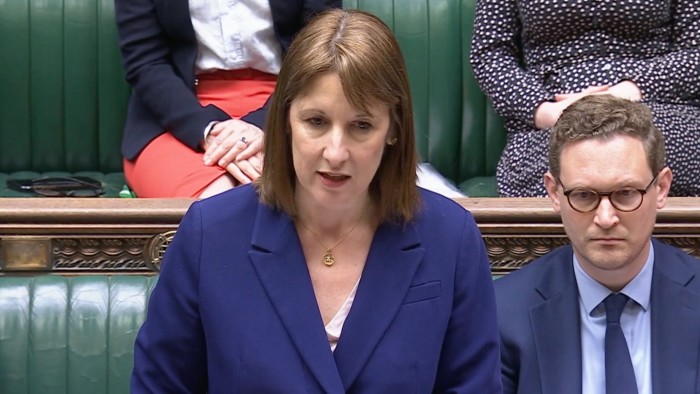Unlock the Editor’s Digest for free
Roula Khalaf, Editor of the FT, selects her favourite stories in this weekly newsletter.
Rachel Reeves has said the Bank of England has reassured her that markets are “functioning effectively” and Britain’s banking system is “resilient”, after US President Donald Trump’s tariff schedule unleashed turmoil across global stock markets.
The UK chancellor told the House of Commons on Tuesday that she had spoken with BoE governor Andrew Bailey earlier in the day and that UK financial authorities were continuing to monitor reaction in the global markets “closely”.
Trump’s fresh tariff regime, unveiled last Wednesday, “has had — and will continue to have — huge implications for the world economy”, Reeves told MPs. But Bailey had “confirmed that markets are functioning effectively and that our banking system is resilient”, she added.
Acknowledging the anxiety felt by many British households and businesses, she told them: “We have your backs.”
Reeves also said she would meet US Treasury secretary Scott Bessent “shortly”. The meeting is expected to take place in coming weeks, but no further details on the timing or location have been confirmed.
Trump said on Monday that Japan was sending a team to Washington to negotiate on trade, suggesting Tokyo was first in the queue to open talks on tariff rates.
Japanese exports having been slapped with a 24 per cent US tariff, a higher rate than the 10 per cent imposed by America on UK exports. But both nations’ automotive industries are facing damaging 25 per cent US tariffs on vehicles.
Speaking in parliament, Reeves said the UK Treasury was among a number of Whitehall departments that were in “ongoing” discussions with the US government in response to the imposition of tariffs.
“The focus is on reducing tariff and non-tariff barriers to trade, with a particular focus on those sectors that are subject to the higher tariffs . . . on cars, on steel and potentially on life sciences”, which are among Britain’s biggest export markets, Reeves said.
The Treasury will use the British Business Bank, the National Wealth Fund and UK Export Finance to try to help UK businesses.
Responding to concerns raised by Mel Stride, Conservative shadow chancellor, about other nations’ “dumping” cheap goods in Britain to avoid US tariffs, Reeves said ministers were working to understand the situation but wanted to “reduce” trade barriers rather than look to create new ones.
The chancellor said that, as global markets plunged in recent days, she had also spoken with her counterparts in Canada, Australia, Ireland, France, Spain and other EU member states.
Reeves added she would speak with India’s finance minister on Wednesday, as London continues to pursue a trade deal with New Delhi.
Reeves said her fiscal rules remained “non-negotiable”, despite growing pressure from some Labour MPs to loosen the constraints on borrowing, describing economic “stability” as “sacrosanct” for the UK government.
She also declined to support an idea proposed by Daisy Cooper, Liberal Democrat Treasury spokesperson, for the UK government to back a “buy British campaign”.
“In terms of ‘buying British’, I think everyone will make their own decisions. What we don’t want to see is a trade war with Britain becoming inward-looking,” Reeves said.
If “every country in the world decided that they only wanted to buy things produced in their country, that’s not a good way forward”, she said, adding that the UK had “benefited hugely” from access to global markets, and continuing to do so was in “our national interest”.
Recommended
Earlier on Tuesday, Sir Keir Starmer briefed cabinet colleagues on his response to Trump’s tariffs and reflected on witnessing “first-hand” their impact on UK automakers after he visited a Jaguar Land Rover plant in the Midlands on Monday.
The prime minister “underlined the government’s resolve to protect our key industries and support the wider economy”, Downing Street said.
Starmer told cabinet ministers that this new era for the global economy was “not a passing phase” and that the UK “must engage with partners around the world to reduce trade barriers”, Number 10 added.



